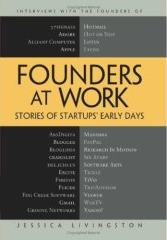Founders at Work
32 großartige Gründergespräche mit dem Who is Who der Internet-/Softwarewelt hat Jessica Livingston (von Y Combinator, Chef Paul Graham lieferte das Vorwort) in ihrem Buch gebündelt. Schöne Geschichten über die Hochs und Tiefs, wie welche Probleme umschifft wurden und was Startups im Kern ausmacht. Aus allen Interviews geht sehr eindrucksvoll hervor, dass nicht eine der 32 Firmen überlebt hätte, hätten sie an ihren ursprünglichen Plänen festgehalten. Alle haben sie sich reorientiert, z. T. sogar extrem.
Lessons learned plus Soundbites
Elementar ist, alle Hirnwindungen lange genug um eine einzige Idee zu wickeln, sich dem Problem voll und ganz in den Weg zu stellen:
I have never had a great deal of trust for people who don't execute on core ideas. I understand the value of needing someone to deal with that kind of stuff – someone's got to do the VC pitch and there's got to be a CFO, etc. But the guy who says, "I have a great idea and I'm looking for other people to implement it," I'm wary of – frequently because I think the process of idea-making relies on executing and failing or succeeding at the ideas, so that you can actually become better at coming up with ideas. It's something you can learn. It's a skill, like weigthlifting. That failed; that worked; continue. You begin to learn how to make ideas. So if you are someone who can't execute and all you can do is come up with ideas, how do you know if they are any good? You don't really know if it's a good idea until you've executed it. You need to understand the cost of execution and so on.
– Joshua Schachter (del.icio.us)
… möglichst schnell auszuliefern und anhand des Anwenderfeedbacks unaufhörlich zu verbessern:
So just get something out there. If you find really early versions of ONElist or Bloglines on archive.org, the websites are horrible. They are crap, they don't have any features, they just try to do one thing. And you just iterate because users are going to tell you what they want, and they're your best feedback. It's critical just to get something out quickly. Just to start shipping and then you can iterate. Because shipping is just this huge hurdle. I've been a part of companies that have had big problems shipping – they just can't ship. It's a psychological thing.
– Mark Fletcher (ONElist, Bloglines)
… und sich von nix und niemandem so schnell entmutigen zu lassen:
I see way too many people give up in the startup world. They just give up too easily. […] I love this stuff; the persistence part is the part that I like. It's actually not fun when it's happening, but you know it makes a difference because 99.9 percent of the people give up.
– Joe Kraus (Excite)
Unternehmergeist schön auf den Punkt gebracht:
I think entrepreneurs want to make money. It's not that they do it for the money, but they want to make money. Because money is the measuring stick; it's how they know if they've won or not. And I think a lot of what drives entrepreneurs is the kind of legacy they are going to leave. They want to make a mark in the world and feel like their life mattered. Entrepreneurs are the kind of people who love ideas and want to build things, and add value to the world.
– James Hong (Hot or Not)
Der Unterton des gesamten Buches ist, dass sich jedes Unternehmen unbedingt einen Teil seiner Startup-Kultur aufrecht erhalten muss.
Schlagwörter: entrepreneurship
blättern: Rivva, vier Supernasen und das Förderland
zurück: Inbox Zero mit Merlin Mann
